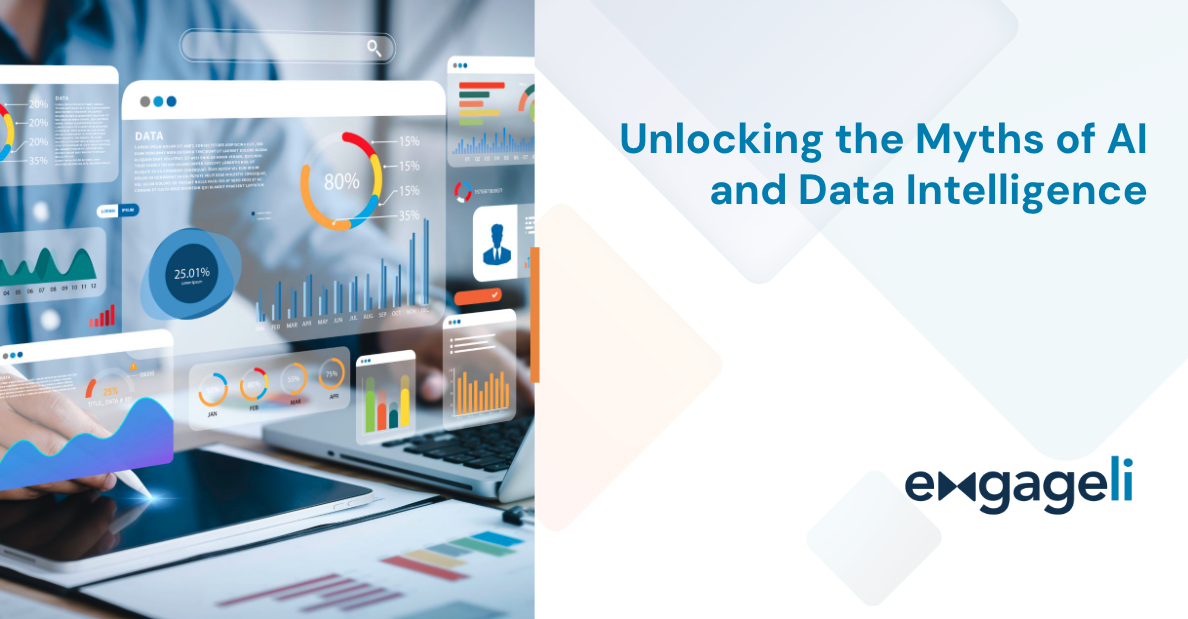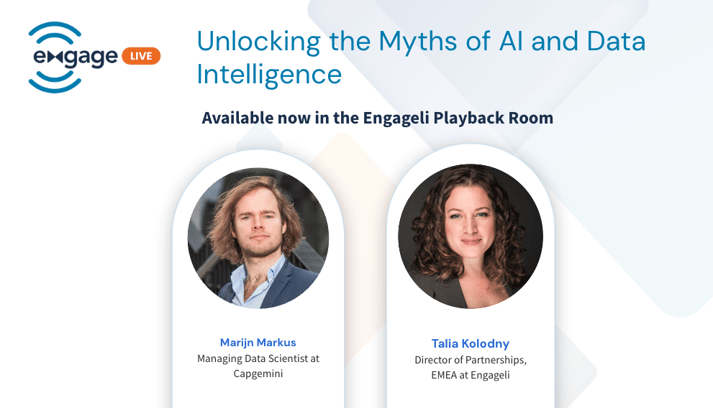Engageli held a virtual panel discussion that explored the field of AI and data intelligence, challenging myths and presenting current real-world applications. The EngageLIVE session was hosted by Talia Kolodny, the Director of Partnerships, EMEA at Engageli. Our featured speaker was Marijn Markus, a managing data scientist at Capgemini with extensive experience modeling people at scale using big data.
EngageLIVE is a series of active learning, thought leadership sessions hosted on the Engageli platform. EngageLIVE sessions go beyond typical webinars by integrating audience involvement, roundtable chats, interactive polls, and Q&A sessions to connect the audience's insights and experiences with the expertise of our guest speakers. Below are a few highlights from the event. To experience the full session anytime, please visit our asynchronous Engageli playback room.
The Current State of AI and Data Intelligence
Marijn began the session by emphasizing how diverse the field of AI has become. Today everything seems to be labeled as AI, from chatbots to autonomous vehicles. But, is a coffee pot that presses a button on voice command actually AI?
He stressed that that the connection between today's buzzwords - the cloud, machine learning, AI - is that they all have data at their core.
Real-World Applications of AI and Data Intelligence
Ultimately, data scientists use data to help people. Marijn highlighted four of his current projects that put AI and data to work for the benefit of society:
1. Helping people safely cross train tracks: AI models can determine if it is safe for a person to cross train tracks. Marijn built a model that used the camera feeds of a train crossing to mark inputs, including the train tracks, the train itself, and the people in the crossing. A secondary model processed this data to provide real-time safety decisions.
2. Using data to help small farmers make better decisions: Project Farm is a data platform helping small farmers in India improve their decision making through big data. The platform leverages local expertise combined with geographic and satellite data to advise farmers on planting decisions, crop yield, and more.
3. Calculating the best way to feed people during crises: With an alarming 40% of the global population lacking access to nutritious food, the World Food Program is finding solutions through data. The World Food Program created models that can calculate how to feed large groups of people as efficiently and healthily as possible. Marijn worked to scale and automate the models in the cloud so that insights can be generated within minutes, rather than days. This speed is critical during crises, such as a famine or spike in food prices. The models can advise governments on the best approaches and alternatives, ultimately leading to more people being fed.
4. Preventing employee burnout and attrition: AI can also help identify specific employees at risk of burnout or attrition using HR metrics, plus provide companies with a personalized readout of contributing factors. This timely data allows organizations to intervene and address the biggest changeable predictors of employee retention and burnout.
The Rise of Generative AI and ChatGPT
Marijn then steered the discussion to the hot topic of generative AI, including ChatGPT. Its potential to pass exams and disrupt traditional forms of assessment has caused debates in the field of education. However, Marijn compared the controversy around generative AI to past technological advancements like typewriters, calculators, and Microsoft Word. As technology and society advance and we automate tasks, we have more time and space to focus on other areas.
Highlighting how AI integrates seamlessly into our daily routines, Marijn cited the evolution of search engines. Once cutting-edge, Google's search engine is now a daily staple, showing AI's potential to become normalized and universally accessible.
Challenges of AI Today
In addition to its advantages and opportunities, Marijn outlined some of the challenges with AI that we are facing today:
• Bias in AI: There are no unbiased algorithms, but there are no unbiased humans either. We need humans to control and check the assumptions of AI. Conversely, we need data to illuminate the biases of humans. To fight bias in AI, the answer lies in keeping things as simple and transparent as possible.
• Exclusivity and access: Technology like ChatGPT is not currently available in all countries.
• Lack of transparency in algorithms: Social media algorithms ban and prioritize information without transparency on their policies.
Using AI in Daily Life
For those eager to learn more about AI, Marijn’s advice was clear: "Just try it!" Rather than worrying about how to best use AI, jump in and experiment with platforms like ChatGPT. The more hands-on experience you have, the more it will spark ideas on how you can use AI in your daily life.
 Want to experience the full session? Join the conversation around AI and data intelligence anytime in our Engageli Playback Room.
Want to experience the full session? Join the conversation around AI and data intelligence anytime in our Engageli Playback Room.
For more timely discussions on topics like this, join us for an upcoming EngageLIVE session!


